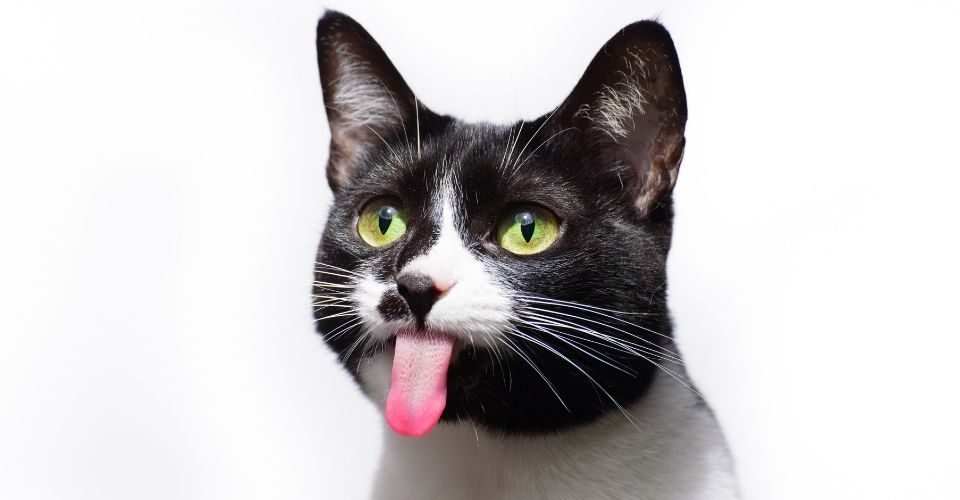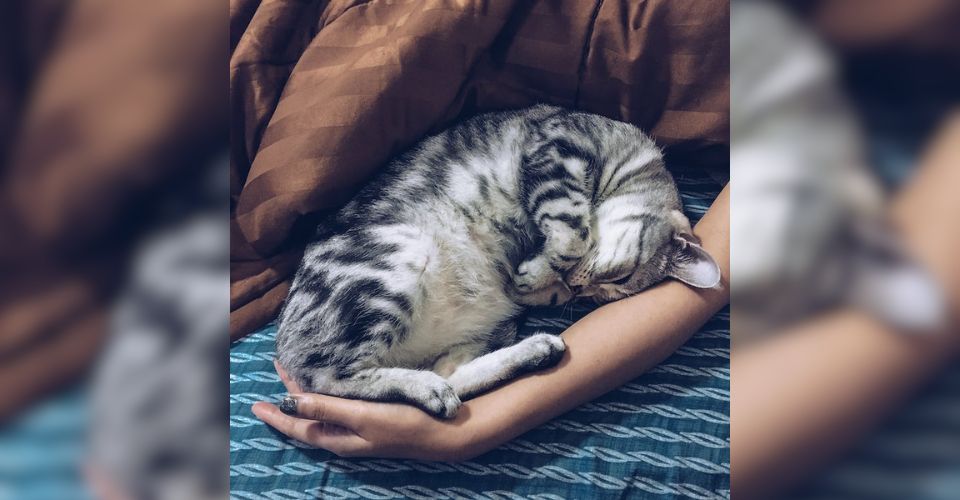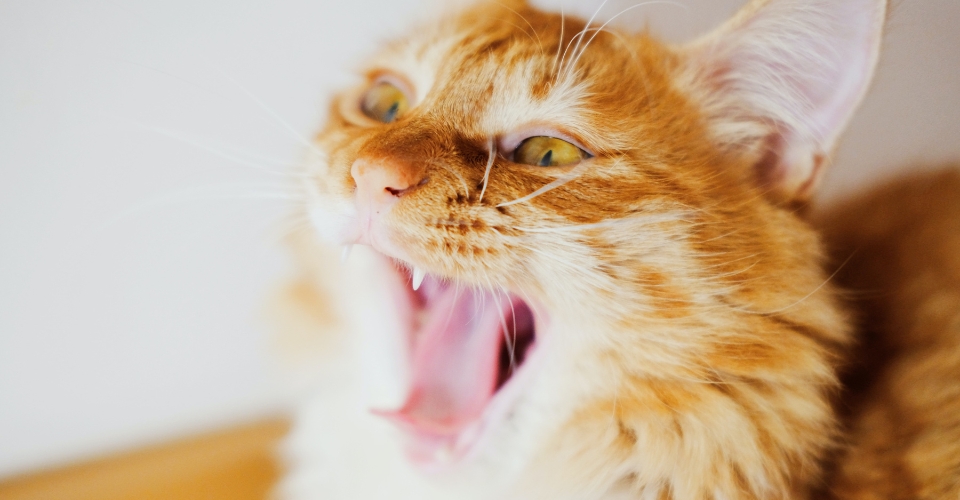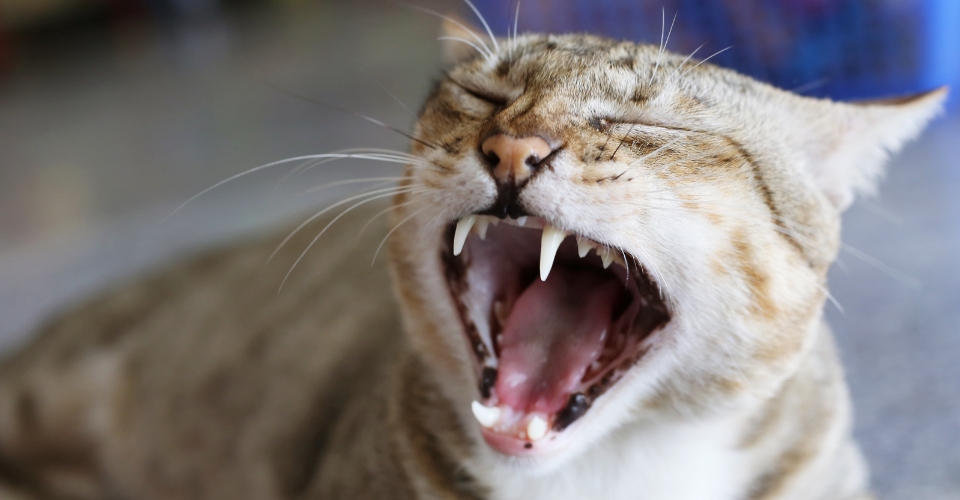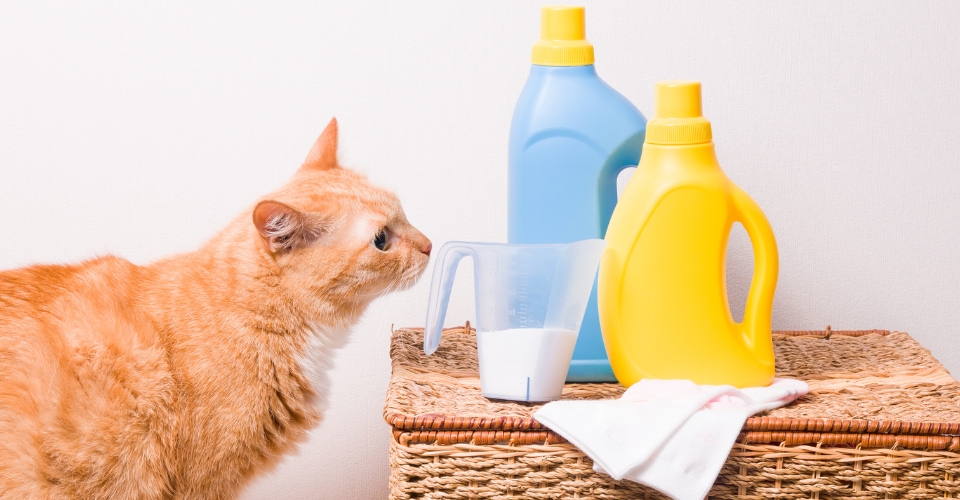It is pretty usual to see dogs panting on a hot summer day—breathing heavily with their mouths open and tongue sticking out. It is a normal cooling mechanism for dogs. But when it comes to cats, panting is not normal. Watching your cat panting, you may ponder why do cats pant? Is it normal for cats to pant? Is there something wrong with my cat?
Do Cats Pant?
Not as much as dogs, but yes, cats pant, too. Rarely, though.
Panting in cats is quite similar to dogs—both breathe heavily with their mouth open and tongue hanging out, making breathing sounds louder. You will be able to listen to their breathing.
While all cats can pant in certain situations, some cat breeds are predisposed to panting. The flat-faced cat breeds, also known as brachycephalic cats, such as Persian, Himalayan, and Burmese cats, are more prone to panting. This is because their face is pushed in, and they have shortened skull bones, which causes them to have narrowed nostrils, leading to the development of many breathing problems.
When the weather is hot, or cats are overheated due to exertion, stress, and anxiety, breathing becomes more difficult for flat-faced cats. In such a situation, you may see your flat-faced cat breathing excessively.
In addition to being more prone to panting, these flat-faced cats are more prone to snoring as well. But why do cat pants anyway?
Cat Panting
Panting is quite rare in cats. But like dogs, cats may pant after intensive exercise session, or when they are anxious, stressed, overheated. However, as soon as the cat gets some rest and calm down, she would stop panting. If it continues to pant, there could be some underlying health issue like asthma, respiratory infection, or heartworm.
| Why Do Cats Pant? | |
|---|---|
| Normal Panting | Abnormal Panting |
| Vigorous exercise | Respiratory infection |
| Stress | Asthma |
| Overheating | Heartworm |
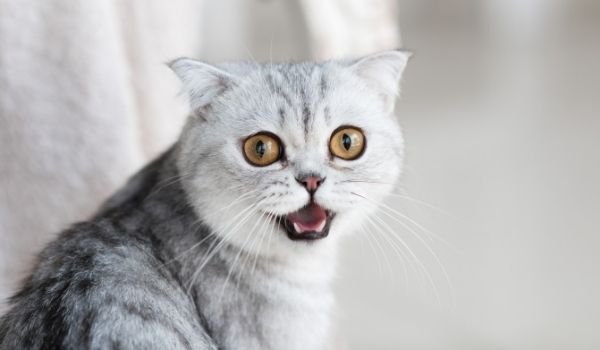
We know cat panting does not look normal, but you do not need to stress. You have to stay calm and look for the reasons your cat is panting. Sometimes, cat panting is entirely normal, and there is nothing for you to be concerned about, especially if you know what kind of cat activity led to panting.
Normal Panting in Cats
According to Dr. Elizabeth Cottrell, it is normal for cats to pant when they are overheated, stressed, and anxious and after heavy play. Still, even in these circumstances, panting in cats is quite rarer as compared to dogs, so you should get extra observant of your cat if you spot her panting. Once your cat has had some time to rest and calm down, this sort of panting would stop. If your cat continues to pant, there is probably something wrong with her.
Let’s discuss when cat panting is normal.
a). After Vigorous Exercise or Heavy Play
Around half of the cats seen at the veterinary clinic are overweight if not obese, according to the Cornell Feline Health Center. Therefore, it is the responsibility of cat owners to ensure that their cats are getting ample exercise daily. However, one should never overdo it.
When people have ample leisure time on weekends, they try to spend most of it with their feline friends, trying to make up for the lost time due to their busy schedules during the weekdays. Cats love nothing more than spending some quality time with their loved ones. So when they get a chance to play with their loved ones, they forget to stop and conserve energy. They will keep going until they start panting.
While your cat may not know when to stop, you should let her rest after few minutes of energetic play, making sure that they are not fatigued.
b). Overheating
Strenuous playtime—chasing, jumping, and playing fetch—make cats hot, and when it is hot outside, it makes things even worse. While cats are pretty good at regulating their body temperature by basking in the sunlight, lying by the radiators in winter, or seeking colder places like the kitchen floor in summers, when they are with their favorite human, they do not want to go away. Therefore, it is necessary that if it’s hot outside, you play with her indoors. And when her body starts warming up, let her rest in a cold spot for some time.
To survive hot summers, outdoor cats rest in shady cold spots, sweat through their paws, lick their paws and skin, and drink water to cool down. When nothing seems to work, they start panting. The panting will go away as your cat cools down, but if it does not, you should ring your vet and make an appointment.
c). Stress
Like humans, cats also experience all sorts of emotions such as fear, stress, and anxiety. But they express their emotions through their body language. For instance, a cat panting with her mouth open is one of the signs of a stressed cat.
Many times, people question why their cat is panting in the car. It is for none other reason than the stress of riding in the car. On top of that, it might be hot in there. Therefore, when taking your cat in a car for a vet visit or some trip, you should always make sure that the car temperature is moderate.
Cats may also pant when they are at the vet clinic, surrounded by unfamiliar faces and stranger dogs and cats. Similarly, when there is a stranger in the house, cats may also pant due to stress.
In the above-mentioned scenarios, if you think your cat is panting continuously, you should intervene and calm her down. You may want to check out our guide on How to Calm Down a Hyper Cat?
Abnormal Panting in Cats
Cat panting that is not due to strenuous activity, overheating, or stress can be a sign that something is off with your fluff ball. Here are some of the common causes of abnormal panting in cats.
a. Respiratory Infection
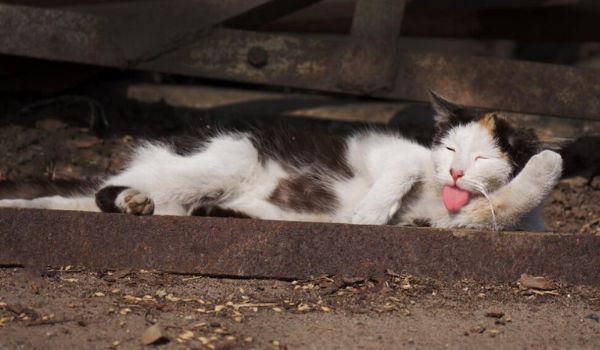
Feline respiratory infection makes it difficult for your four-legged friends to breathe. They often start panting when they are not getting ample oxygen. These respiratory infections are basically viral, but a secondary bacterial infection may often develop, requiring antibiotics for treatment. In these conditions, steam and humidifiers help ease down the breathing difficulty.
b. Asthma
When a cat inhales allergic particles, she may suffer from asthma, which in addition to triggering panting, also causes coughing and wheezing. Medications such as bronchodilators are used for this condition, which make breathing easier by dilating the bronchi and bronchioles. But any kind of medication should be prescribed only by a certified vet.
c. Heartworm
While heartworm is more prevalent among dogs, felines are also affected by it. Most heartworms do not survive till adult age in cats, and therefore, it usually goes undiagnosed. They cause a situation known as heartworm-associated respiratory disease (HARD) in cats, causing difficulty breathing and leading to panting in cats. According to the American Heartworms Society, as the dog treatment for heartworm infection cannot be applied to cats, our only option is to protect our cats from catching the worms.
When Is It Time To Take Your Cat to the Vet?
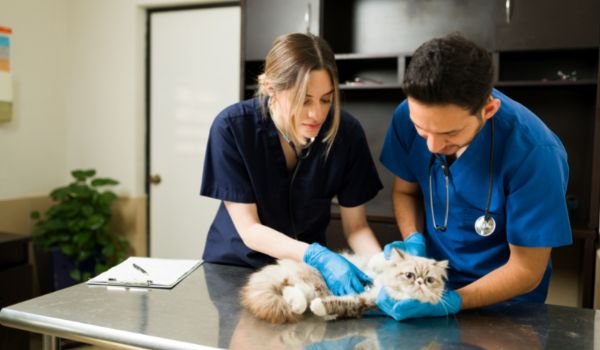
You should take your cat to the vet as soon as you start observing continuous difficult breathing and other signs of sickness in cat.
Cats are stoic creatures, meaning that they hide their signs of sickness until it becomes impossible for them to conceal. Therefore, it is necessary that you are always observant of your cat’s behavior as she would exhibit some subtle signs of their sickness.
The normal breathing rate for cats and dogs is between 15 to 30 breaths per minute. So if your cat has been breathing heavily for quite some time, you should be concerned. If no overheating, stress or heavy play is involved, there might be something wrong with your cat. So you should consult a veterinarian right away.

